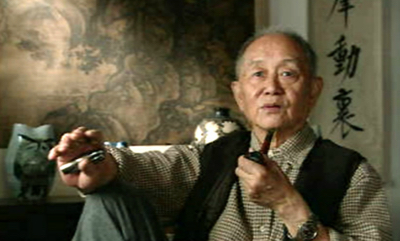










|
|
Huang Yongyu
(see also the
Enemies
section of
Living Revolution)
Artist and writer Huang Yongyu is one of China’s most famous
cultural figures of the last half-century. He was a professor at the
Central Art Academy, and became one of the principal targets of the
Cultural Revolution. Mao Zedong's wife, Jiang Qing, helped organize
the Black Painting Exhibition, which featured Huang's works. Huang
was incarcerated in a makeshift prison referred to as ox-pens since
the prisoners were called, in Mao's terms, "ox-demons" and
"snake-spirits." He was later exiled to the countryside.
"A Can of Worms" is a collection of aphorisms and witty lines that Huang
distributed among his friends; some of the writings made humorous
use of Party jargon. In the summer of 1966, these private writings
were declared to be counter-revolutionary. Huang was criticized,
denounced in public meetings, and severely beaten.
MY "CAN OF WORMS" - an introduction by Huang Yongyu

I started writing these 'animal tidbits' during moments of boredom and frustration while in Xingtai in 1964. It was just before the
earthquake and I'd been sent to a commune production brigade there
as part of the 'Four Cleans' Campaign. Eventually, I found I had a
collection of over eighty of them. Some comrades who saw them
thought they were great fun, laughing so hard they couldn't stand up
straight. I too was pleased with the result and thought I'd try and
publish a small volume of them, with illustrations, when I got back
to Peking.
The ten year holocaust started out with over one thousand comrades
in the arts being rounded up and confined in the western suburbs of
Peking. Although comfortable enough, we were in a state of intense
nervous anxiety. It was a time when one could find little joy in
life. After a month or so they read our names from a roll and
shipped us off to "school" to attend our first exuberant and
magnificent struggle meeting, all done in the style of a Roman
triumph.
On the second day at "school", I was called into a classroom which
was completely empty apart from a row of young people seated like a
panel of judges. I stood before them in the middle of the room. I
noticed that one of them was smiling. It was one of the fellows who
had thought my Can of Worms such fun back in 1964, perhaps he was
even one of those who laughed so much he couldn't stand straight...
I was ordered to hand over the manuscript.
As a mentally stable person, I have been able to tolerate all manner
of abnormality over the past decades. Yet even now, whenever I think
of the smile on the face of that young man, a shiver of horror goes
through me.
The great master Leonardo da Vinci painted that famous smile on Mona
Lisa's lips, but I wonder if anyone would want to paint a
terrifying, haunting smile as that young man wore? To paint the
smile of a Judas, a Sha Wei (de Sade?), Iago or Haake, smiles that
revel in murder, calumny and betrayal.
Over thirty years ago, I saw a film version of Eric Maria Remarque's
novel Arch of Triumph . It starred Ingrid Bergman, and Charles Boyer
played her lover Dr. Ravic. That marvelous actor Charles Laughton
was Haake, the head of the Nazi secret service. He would smile while
he tortured Ravic, licking his lips in pleasure.
I must have been too young and innocent then for I thought that evil
would have to appear ugly, instantly recognizable for what it was.
How could they possibly portray such a terrible man smiling like
that? And who would have thought that one day I would come across
that very same smile in real life; or that I would have ten long
years in which to reflect on their similarities and differences?
These eighty or so epithets were once a cross which at first I had
to bear and upon which I was eventually nailed. But at last I was
taken down from it. My release, however, meant that some people
would not be smiling any more.
Nonetheless, it is my heartfelt wish that soon these people too will
be able to smile or even laugh as other healthy and normal people
do; to live like human beings and not as I had to, like a wild beast
or an insect. How I hope they will never again attempt to feed off
the lifeblood of others or even stir up trouble.
The original copies of my epithets were all lost, yet thanks to the
efforts of friends and strangers they have been collected and
preserved for me - some people had copied them from posters used to
denounce me. The amusing thing is that some of "my" epithets that
were thus collected were not by me at all. Although one could tell
at a glance that they were written better than mine, as they are not
my work, I have had no choice but to leave them out of this
collection, albeit with the greatest reluctance.
11 April, 1983
Preface to a work done in 1964.
written by Huang Yongyu
translated by Geremie R. Barmé
|